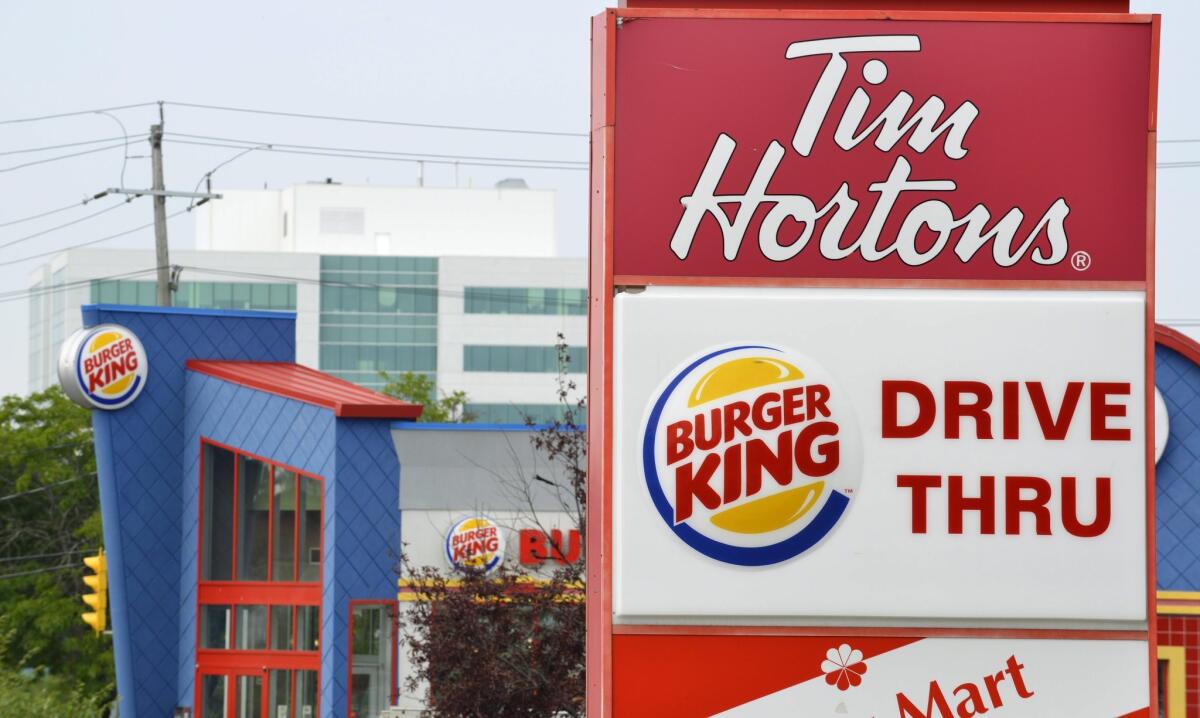Opinion: Burger King boycott: How long can you stick to sticking it to BK?

- Share via
So, Burger King’s bugging out on the United States of America.
Henceforth, Burger King Worldwide Inc. will be a Canadian company; the fast-food King is taking up official residence in a country with a queen. The company headquartered in Miami will have to swap Grey Goose oceanfront cocktails for Canada Goose-brand winter coats.
Burger King’s executive chairman, Alex Behring, protests that this is “not a tax-driven deal,” like other tax inversion businesses decamping from these shores — companies President Obama has called “corporate deserters.”
Burger King’s overall effective tax rate last year was 27.5%, while the effective tax rate of Tim Hortons, the Canadian doughnut-and-coffee chain BK is buying to plant its flag in the Great White North, was 26.8%.
To this country, where fast food is elevated to a lifestyle and an industrial scale, the defection seems like betrayal.
Twitter and Facebook are ringing with pledges of BK boycotts to teach the company a lesson. Ohio Democratic Sen. Sherrod Brown is joining them.
Boycotting BK over its defection — sentiments I share, for all that I’m a vegetarian — is admirable, and the boycott is one of the few ways that Americans who don’t carry stock portfolios can make their displeasure felt in boardrooms.
But let’s not kid ourselves. In a month — all right, six months — you’ll probably be back at BK again. You’ll be driving home late, and hungry, and there it is, and it’s just this once, and ….
I don’t question our motives, only our stick-to-it-iveness. Sometimes Americans have stayed with boycotts until the target knuckled under. The table grape boycott in support of the United Farm Workers went on for years, and long after the UFW got its contract, tender-hearted, long-memoried yuppies still steered clear of the fruit. Ten years ago, Southern California shoppers made a bit of a dent in some grocery-chain sales when they boycotted them in support of striking grocery workers.
On the heels of years of refusing to observe the Martin Luther King Jr. holiday, Arizona finally said “uncle” after losing conventions and concerts and, finally, a Super Bowl. A dozen or so years later, the city of Los Angeles was among the institutions and businesses that withheld their custom from Arizona because of the state’s anti-illegal immigration law, chunks of which were later struck down by the U.S. Supreme Court. (The city’s own boycott fell short of its supporters’ hopes.)
Less successfully, Southern Baptists boycotted Disney for promoting a gay agenda, then dropped it eight years later, and at least three times in 30 years Americans have boycotted Russian vodka, which still shows up on just about every cocktail menu.
A boycott’s a fitting kind of “capitalist punishment,” but outrage is hard to sustain, and the lure of convenience is powerful. Ask the people in line at Whole Foods and Hobby Lobby and Chick-fil-A: How are those boycotts doing?
You want to know what will really drive away BK customers? Serving those fries Canadian-style: with cheese curds and gravy.
Follow Patt Morrison on Twitter @pattmlatimes
More to Read
A cure for the common opinion
Get thought-provoking perspectives with our weekly newsletter.
You may occasionally receive promotional content from the Los Angeles Times.










